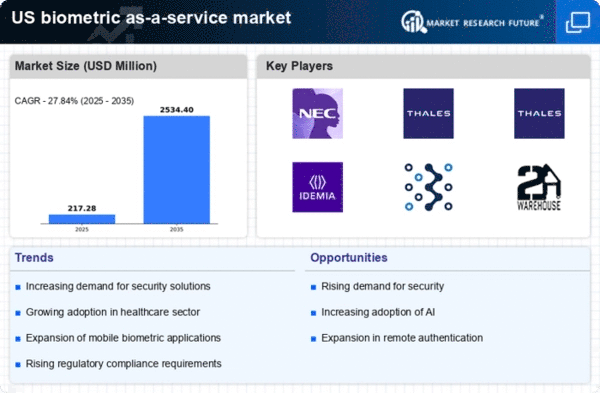Increased Focus on Customer Experience
The biometric as-a-service market is witnessing an increased focus on enhancing customer experience. This is achieved through seamless authentication processes. Organizations are recognizing that user-friendly biometric solutions can significantly improve customer satisfaction and engagement. In 2025, the market is projected to grow as businesses implement biometric technologies to streamline user interactions, particularly in sectors such as retail and hospitality. By offering quick and secure access to services, companies can foster loyalty and retention among customers. This emphasis on customer experience is likely to drive the adoption of biometric solutions, as organizations seek to differentiate themselves in competitive markets. The biometric as-a-service market is thus positioned to benefit from this trend, as businesses prioritize innovative solutions that enhance user convenience and security.
Expansion of Mobile and IoT Applications
The expansion of mobile and Internet of Things (IoT) applications is significantly impacting the biometric as-a-service market. As mobile devices become increasingly integrated into daily life, the demand for biometric authentication on these platforms is rising. In 2025, the market is expected to see substantial growth, driven by the proliferation of mobile applications that utilize biometric technologies for secure access. Additionally, the integration of biometric solutions into IoT devices is creating new opportunities for identity verification in smart homes and connected environments. This trend suggests that the biometric as-a-service market will continue to evolve, adapting to the needs of a more connected world. As consumers seek convenience and security in their interactions with technology, the demand for biometric solutions is likely to increase, further propelling market growth.
Rising Demand for Enhanced Security Solutions
The biometric as-a-service market is experiencing a notable surge in demand for enhanced security solutions across various sectors. Organizations are increasingly recognizing the limitations of traditional authentication methods, which are often vulnerable to breaches. In 2025, the market is projected to reach approximately $3 billion, driven by the need for more secure and reliable identity verification processes. This trend is particularly evident in sectors such as finance, healthcare, and government, where data protection is paramount. As cyber threats evolve, the biometric as-a-service market is likely to expand, offering innovative solutions that leverage biometric data for secure access control and identity management. The increasing frequency of data breaches has prompted businesses to invest in biometric technologies, thereby propelling the growth of the biometric as-a-service market.
Technological Advancements in Biometric Systems
Technological advancements are playing a crucial role in shaping the biometric as-a-service market. Innovations in biometric recognition technologies, such as facial recognition, fingerprint scanning, and iris recognition, are enhancing the accuracy and efficiency of identity verification processes. In 2025, the market is expected to witness a compound annual growth rate (CAGR) of around 20%, fueled by these advancements. The integration of cloud computing and artificial intelligence into biometric systems is enabling organizations to deploy scalable and cost-effective solutions. As businesses seek to streamline operations and improve user experiences, the demand for sophisticated biometric solutions is likely to increase. This trend indicates a shift towards more automated and intelligent systems within the biometric as-a-service market, ultimately enhancing security and operational efficiency.
Growing Regulatory Pressure for Identity Verification
The biometric as-a-service market is significantly influenced by growing regulatory pressure for robust identity verification processes. Regulatory bodies are increasingly mandating stringent compliance measures to protect sensitive data and ensure secure transactions. In 2025, it is anticipated that the market will benefit from these regulations, as organizations seek to adopt biometric solutions to meet compliance requirements. The financial services sector, in particular, is under heightened scrutiny, with regulations such as the Bank Secrecy Act and the USA PATRIOT Act necessitating effective identity verification methods. As businesses strive to adhere to these regulations, the biometric as-a-service market is likely to expand, providing solutions that facilitate compliance while enhancing security. This regulatory landscape is expected to drive innovation and investment in biometric technologies, further solidifying their role in identity management.
















